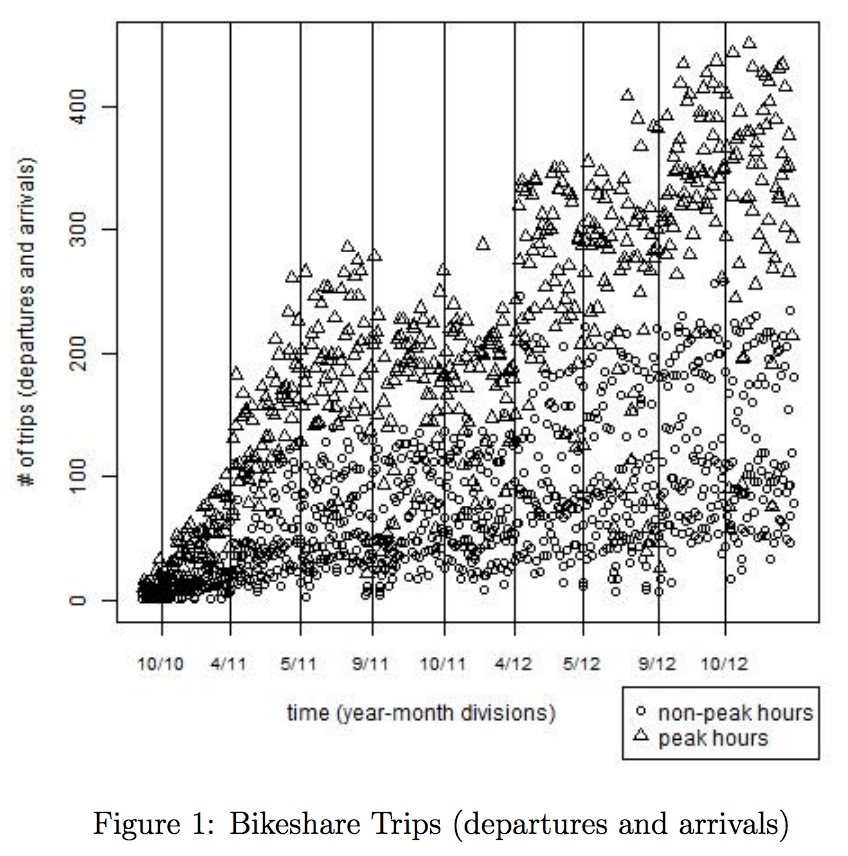RESOURCES FOR THE FUTURE
Introduction
Tailpipe emissions from transportation constitute 27% of greenhouse gas emissions in the United States. The effect of automobile pollution is amplified further by increases in congestion in urban areas, which exacerbate both private and public damages. Schrank et al. (2012) estimate national congestion costs arising from time loss and wasted fuel at more than $120 billion in 2011, while annual CO2 emissions attributable strictly to congestion are 56 billion pounds.
In response to these concerns, government agencies have imposed highway tolls, built high-occupancy vehicle lanes, invested in public transit infrastructure, imposed fuel economy standards, and relied on voluntary information campaigns in an effort to reduce vehicle miles traveled (VMTs), alleviate congestion, and mitigate the associated environmental damages. A new mechanism to reduce urban traffic congestion that is currently gaining traction for its purported cost-effectiveness, environmental-friendliness, and positive health impacts is the adoption of citywide bicycle-sharing systems. This infrastructure provides an alternative to driving for short trips and extends the existing network of public transit within a metropolitan area. Further, bicycling infrastructure augments the environmental bona fides of densely populated urban areas (Kahn, 2010). If bikeshares reduce traffic congestion, they may provide a low-cost policy lever to reduce automobile externalities in urban areas.
Bicycle-sharing programs have seen substantial uptake in European cities such as Amsterdam, Paris, Copenhagen, and London, but only recently have US cities adopted these transportation systems (Nair et al., 2013).3 Of note, Washington, DC, Minneapolis-St. Paul, Boston, and New York City have in-stalled city-wide bikeshares. It is thus worth examining the policy importance of environmental benefits of a bicycle-sharing program in urban areas. Specifically, we focus on metropolitan Washington, DC’s, Capital Bikeshare, which was introduced in 2010. Schrank et al. (2012) show that the Washington area ranks first in pounds per automotive commuter for CO2 emissions produced during congested travel, at 631 pounds per commuter annually. This estimate, of course, ignores any local pollutants that contribute to ambient air quality. Further, a journalist at the Washington Post notes, “Capital Bikeshare … funded the original bikes and the docking stations with federal grants earmarked for local programs that mitigate congestion and improve air quality.”4 In particular, Capital Bikeshare leveraged federal money through the Congestion Mitigation and Air Quality Improvement Program (CMAQ), which funds programs in air quality nonattainment areas for ozone, carbon monoxide, and particulate matter that reduce congestion related emissions. In order to assess these environmental benefits, however, a causal link between bikeshares and traffic congestion must be established; identifying this effect is the focus of our paper.
Specifically, we motivate a conceptual framework for examining the impacts of introducing additional transportation options into an existing transit network within a large metropolitan area. Using the introduction of the Capital Bikeshare program as a source of quasi-experimental variation, we examine the effects of bikeshare dock locations on traffic congestion. The expansion of the bikeshare program between 2010 and 2012 allows for identification of changes in congestion within a neighborhood over time. Bikeshare dock locations and ridership history from the start of the program are matched with micro-level traffic data on a finely defined spatial and temporal scale within the city. These data provide an advantageous approach to examining within-city commuting decisions as opposed to examining changes in traffic patterns on major thruways and arterial highways. In the economics literature, this is the first paper to examine the causal effect of large-scale bicycle-sharing infrastructure on motor vehicle traffic, with implications for environmental and health benefits.
Empirically, we develop a framework to capture the effect of bikeshare systems on traffic congestion in multiple ways. Fixed effects models controlling for time-invariant unobservables in a neighborhood allow us to explore the effect of the bikeshare systems on traffic congestion, while highlighting the bias from endogenous selection of bikeshare locations. Our preferred causal specifications, using the presence of a bikeshare dock as a treatment, utilize a series of matched samples on observable socioeconomic characteristics and pre-treatment traffic congestion to mitigate the effect of selection bias. Estimates from our preferred models range from a 2 to 3% reduction in congestion due to the presence of a bikeshare. For context, a 1% reduction in congestion results in a roughly 1% increase in vehicle miles per hour driven for a representative road segment in our sample. Additionally, we model the effect of bikeshare docks in adjacent neighborhoods. We find some evidence that congestion increases in neighborhoods adjacent to those that possess a bikeshare dock. These spatial spillovers are potentially driven by motor vehicle drivers avoiding bicycle traffic.
In the next section, we outline the relevant literature as it relates to traffic congestion and environmental quality. We develop in Section 3 a stylized model of transportation choice to motivate our empirical analysis. In Section 4, we describe the data used. We present our quasi-experimental strategy and empirical models in Section 5 and discuss results in Section 6. Policy implications are discussed in Section 7, followed by robustness checks in Section 8 and conclusions in the final section
Download full version (PDF): Bicycle Infrastructure and Traffic Congestion
About Resources for the Future
www.rff.org
Resources for the Future (RFF) is an independent, nonpartisan organization that conducts rigorous economic research and analysis to help leaders make better decisions and craft smarter policies about natural resources and the environment.
Tags: Bicycling, Bike Share, Bikeshare, Capitol, Cycling, D.C., Resources for the Future, RFF, Washington







 RSS Feed
RSS Feed